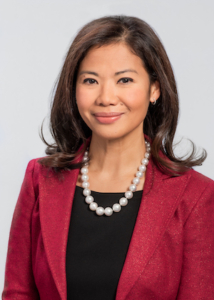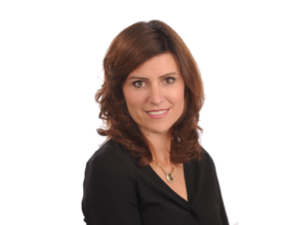 “Joining Wells Fargo & Company when I did, just prior to Covid-19 has certainly given new meaning to the phrase ‘trial by fire’ as I had to learn how to effectively navigate within the firm on a very quick timeline.”
“Joining Wells Fargo & Company when I did, just prior to Covid-19 has certainly given new meaning to the phrase ‘trial by fire’ as I had to learn how to effectively navigate within the firm on a very quick timeline.”
Yeng Butler joined Wells Fargo Asset Management as the head of Liquidity Client Group in November 2019, after eight years at State Street. However, Yeng Butler’s career has been anything but linear. She recounts that she has always followed her curiosity and hasn’t been afraid to look beyond immediate and obvious career opportunities.
“Trust yourself.” She states, “I have taken risks that other people might not have taken. There are choices to make and you can benefit by taking a broader approach, and not be so linear, narrow or ‘safe’ in your career choices.”
The Importance of a Sponsor
As a student of government and Asian studies, Yeng entered financial services via a graduate training program at Merrill Lynch which gave her a two-year rotational experience in New York working in investment banking, private wealth, equity sales and trading, asset management as well as the retail aspect inside branches.
During one of those rotations, she met a person who would become a lifelong sponsor of hers.
“Before the program ended, I proactively called my sponsor up and asked if he would consider hiring me, as I knew I could learn so much from him, and that this was someone that I wanted to work with.”
The sponsor immediately said yes and thus began an eight-year journey from analyst to salesperson to vice president of sales leading a team. In 2010, the sponsor who had given her the first big break called again and invited her to come and work with him back in Boston with State Street.
By this time, Yeng was based in the West Coast. “We loved the Northern Californian way of life, but I knew I was ready for a big challenge again. From a team of two people, we built the business to a global team of 30. It was there I realized that my skillset and passion was strong on build outs and turnaround work.”
Butler is excited about her role at Wells Fargo Asset Management and is currently managing a team of thirty and is running a business with $240B under management. She took the role because she wanted to solidify her skills around expansion of an established business.
“The mandate is to double the business which despite what is going on is a very exciting challenge and the new flows have already surpassed our targets for the year.”
When asked about career advice to her younger self, Butler states that she would have told herself to shake off the imposter syndrome.
“Own your voice! You are expected to have an opinion so offer it, and do so cogently.”
Butler believes that constantly developing EQ (emotional intelligence) around communication and how to deliver the message effectively is something that is a critical skill to develop for everyone to bring others along on any journey. She also recognizes the value of other traits and behaviors in the Wells Fargo culture that she is embracing.
“There is great collaboration here and although it’s a big company, there is a sense of urgency to get things done. In addition, I see a lot of women in senior leadership roles and there are clearly so many areas of opportunity here. There are visible jobs for women at Wells Fargo outside of the stereotypical areas.”
The Wider Road Taken
Talking about wider as opposed to narrow and linear career paths that many people follow, Butler, despite having a clear path of institutional sales ahead of her, left Merrill Lynch in 2004 to pursue a master’s degree.
“I knew if I stayed that I would stay in institutional sales and that would be all there was to my story and although it was hard to leave, I believe to this day, it was courageous. Courage to take the non-traditional path, to carve your own career path and to do so with thoughtfulness and patience. ”
Six months before starting her masters at the Harvard Kennedy School of Government to pursue a graduate degree in public administration, she set off to volunteer in Western Samoa.
“I reached out to a great organization called MicroDreams, who provide microloans to women entrepreneurs. I said I have six months to offer you, can I be of any help?”
This opportunity was enriching after graduating from Harvard. Butler saw that environmental, Social and governance (ESG) investing and policy was an emerging area and moved to the Bay Area in 2005 to work for a policy organization called Business for Social Responsibility.
The Balancing Act
Yeng Butler candidly talks about how she purposely opted out after six months to focus on starting and caring for a family, which included running her own business.
“I lasted six months before realizing it just was not a fit for me. I think fit is important to talk about. I made the choice to run a retail insurance business and it was an excellent lifestyle business where I could bring my infant daughter to work. I hired and managed a team of eight people and got to keep my skills sharp on my terms.”
She muses on the having-it-all question. And lands on that she believes that you can have it all – but not all at once.
“Now that my kids are older, I have a bit more flexibility to be hyper-focused at work. However, when I am with them, I try to be entirely present, and that means putting the mobile phones in a drawer.”
In her spare time, Butler enjoys spending time with her family solving jigsaw puzzles, tinkering in her vegetable garden and watching her daughter perform in musical theater.


 Wells Fargo’s Kristi Mitchem believes that women need to visibly support one another. Where a man might readily high five another man for something unremarkable, research shows that women can be more reserved in their praise. Women are naturally aligned with other women and as such, Mitchem stresses the importance of consciously and vocally “friending” one another in corporate settings. “I tell women not to come out of a meeting without commending another woman. You want her to know that it’s important that she shared her opinion,” Mitchem says. “You also want the men in the room to recognize that she has value to add. “
Wells Fargo’s Kristi Mitchem believes that women need to visibly support one another. Where a man might readily high five another man for something unremarkable, research shows that women can be more reserved in their praise. Women are naturally aligned with other women and as such, Mitchem stresses the importance of consciously and vocally “friending” one another in corporate settings. “I tell women not to come out of a meeting without commending another woman. You want her to know that it’s important that she shared her opinion,” Mitchem says. “You also want the men in the room to recognize that she has value to add. “